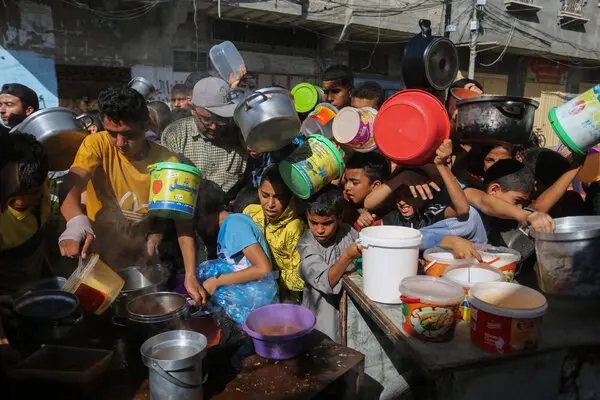Gaza Health Emergency: Malnutrition Crisis Devastates Lives Across Generations
The situation in Gaza has reached a critical point, with at least 20 people succumbing to malnutrition and dehydration at Kamal Adwan and Shifa hospitals, according to the Health Ministry. The victims include children, some as old as 15, as well as a 72-year-old man. The ongoing siege and offensive by Israel have exacerbated the suffering, leading to a man-made famine that has claimed vulnerable lives.
Northern Gaza, in particular, faces acute hunger due to isolation by Israeli forces and prolonged food supply cutoffs. Access to aid is more regular in the south, but even there, vulnerable children are falling victim to malnutrition-related causes. The Emirati Hospital in Rafah reported 16 premature baby deaths over the past five weeks due to malnutrition.
The devastating impact of Israel’s bombardment and ground assaults is evident in the staggering number of children killed, comprising nearly three-quarters of the over 30,800 Palestinians killed, according to the Gaza Health Ministry. Malnutrition, a slow but deadly consequence, disproportionately affects children and the elderly. Underfed mothers struggle to breastfeed, while rampant diarrheal diseases, fueled by the lack of clean water and sanitation, leave many unable to retain essential calories.
Israel’s strict control over the entry of food, water, and medicine, initiated after its assault on Gaza following an attack by Hamas, has led to a dire humanitarian crisis. The blame game includes accusations from Israel, pointing fingers at U.N. agencies for failing to distribute supplies, while UNRWA cites restrictive Israeli measures and cumbersome inspections hindering efficient aid delivery.
Desperation, grief, and horror are pervasive in Gaza’s north, which has been under Israeli control for months. Entire districts lie in ruins, and access to basic necessities such as meat, milk, vegetables, and fruit is nearly impossible. Shops offer only a limited selection at inflated prices, pushing residents to resort to unconventional sources like weeds for sustenance.
The dire circumstances have forced families to adopt desperate measures, such as using food meant for rabbits as flour. Malnutrition is rampant, with the acting head of Kamal Adwan Hospital reporting that 75% of the 300 to 400 children treated daily are suffering from malnutrition.
Efforts to provide aid face significant challenges, with sporadic and dangerous truck deliveries and limited amounts from recent airdrops. The World Food Organization, unable to deliver supplies to the north for two weeks, emphasizes the urgent need for sustained humanitarian assistance.
Despite the International Court of Justice’s order for immediate measures to protect Palestinians in Gaza, compliance has fallen short. The failure to address this crisis puts countless lives at risk, with malnourished children facing an uncertain future.
In Rafah, the plight is worsened by a dwindling supply of fresh food and a population exceeding 1 million due to displacement. Canned goods, often found in aid packages, are the mainstay, but their availability is dwindling. Premature baby deaths at the Emirati Hospital reveal the depth of the crisis, with malnourished mothers and extreme stress contributing to underweight births.
The heartbreaking reality of Gaza demands immediate attention and concerted international efforts to alleviate the suffering and prevent further loss of innocent lives. The need for a comprehensive and sustained humanitarian response is paramount to addressing the multifaceted challenges faced by the people of Gaza.


















